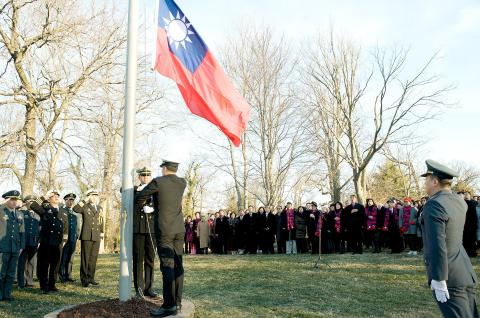The raising of the Republic of China’s (ROC) national flag at a New Year’s Day ceremony at Twin Oaks Estate in Washington last week was “not consistent” with US policy, US Department of State spokesperson Jan Psaki said on Monday.
“We did not know about the Jan. 1 flag-raising at Twin Oaks in advance,” she said.
The statement — made in answer to a question at the daily press briefing — came as a surprise.

Photo: CNA
Representative to the US Shen Lyu-shun (沈呂巡) was quoted following the flag-raising ceremony as saying he had notified the administration of US President Barack Obama in advance and was granted permission to raise the flag as long as it was not widely publicized.
The Taipei Economic and Cultural Representative Office (TECRO) in Washington referred questions about Psaki’s reaction to the Ministry of Foreign Affairs in Taipei.
According to earlier reports, Beijing was “furious” about the flag-raising and lodged a formal objection.
It was believed to be the first time that the Taiwanese flag had been raised at Twin Oaks — the residence of the nation’s official representative to the US — since the US switched diplomatic recognition from Taipei to Beijing 36 years ago.
Sources who closely monitor the Taiwan-US relationship told the Taipei Times on Monday they were “very surprised” by the State Department statement because it seemed “inconceivable” that TECRO would raise the flag without US permission.
“Why do it now? It doesn’t make any sense,” one source said.
He said the relationship was so “sensitive” and subject to such tight diplomatic protocols that nothing could be gained and potentially much goodwill could be lost by ignoring the agreed-upon rules.
Psaki said that the US remained fully committed to the “one China” policy, based on the three communiques and the Taiwan Relations Act.
“No US government personnel attended the event in any capacity,” Psaki said.
“Nothing has changed as it relates to our relationship,” she added.
A US reporter asked: “Are you objecting to a private ceremony at which there was — that some people raised the Taiwanese flag?”
“We just said the ceremony is not consistent with our policy. That’s it,” Psaki replied.
The reporter pressed: “Well, so what?”
Psaki said she had been asked for the US position on the flag-raising and was giving that position.
The reporter then asked: “If I raise the flag of Narnia over my house, that’s going to be inconsistent with US policy?”
There was laughter in the press room as Psaki answered: “We may talk about you, but I don’t know if I’ll have a US government comment on it.”
The reporter asked if the US government was involved “in any way, shape or form” in the raising of the Taiwanese flag at Twin Oaks.
“No, we were not,” Psaki said. “We didn’t attend. We didn’t know about it. That’s our specific comment.”
The reporter asked: “Can you not raise the Taiwan flag in the United States? Is that what you’re saying?”
“I don’t have anything more,” Psaki replied.
Finally, she was asked if China had made a protest and she said: “I’d point you to the Chinese on that.”

US President Donald Trump yesterday announced sweeping "reciprocal tariffs" on US trading partners, including a 32 percent tax on goods from Taiwan that is set to take effect on Wednesday. At a Rose Garden event, Trump declared a 10 percent baseline tax on imports from all countries, with the White House saying it would take effect on Saturday. Countries with larger trade surpluses with the US would face higher duties beginning on Wednesday, including Taiwan (32 percent), China (34 percent), Japan (24 percent), South Korea (25 percent), Vietnam (46 percent) and Thailand (36 percent). Canada and Mexico, the two largest US trading

AIR SUPPORT: The Ministry of National Defense thanked the US for the delivery, adding that it was an indicator of the White House’s commitment to the Taiwan Relations Act Deputy Minister of National Defense Po Horng-huei (柏鴻輝) and Representative to the US Alexander Yui on Friday attended a delivery ceremony for the first of Taiwan’s long-awaited 66 F-16C/D Block 70 jets at a Lockheed Martin Corp factory in Greenville, South Carolina. “We are so proud to be the global home of the F-16 and to support Taiwan’s air defense capabilities,” US Representative William Timmons wrote on X, alongside a photograph of Taiwanese and US officials at the event. The F-16C/D Block 70 jets Taiwan ordered have the same capabilities as aircraft that had been upgraded to F-16Vs. The batch of Lockheed Martin

GRIDLOCK: The National Fire Agency’s Special Search and Rescue team is on standby to travel to the countries to help out with the rescue effort A powerful earthquake rocked Myanmar and neighboring Thailand yesterday, killing at least three people in Bangkok and burying dozens when a high-rise building under construction collapsed. Footage shared on social media from Myanmar’s second-largest city showed widespread destruction, raising fears that many were trapped under the rubble or killed. The magnitude 7.7 earthquake, with an epicenter near Mandalay in Myanmar, struck at midday and was followed by a strong magnitude 6.4 aftershock. The extent of death, injury and destruction — especially in Myanmar, which is embroiled in a civil war and where information is tightly controlled at the best of times —

China's military today said it began joint army, navy and rocket force exercises around Taiwan to "serve as a stern warning and powerful deterrent against Taiwanese independence," calling President William Lai (賴清德) a "parasite." The exercises come after Lai called Beijing a "foreign hostile force" last month. More than 10 Chinese military ships approached close to Taiwan's 24 nautical mile (44.4km) contiguous zone this morning and Taiwan sent its own warships to respond, two senior Taiwanese officials said. Taiwan has not yet detected any live fire by the Chinese military so far, one of the officials said. The drills took place after US Secretary